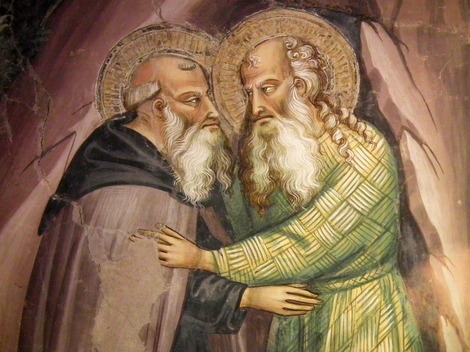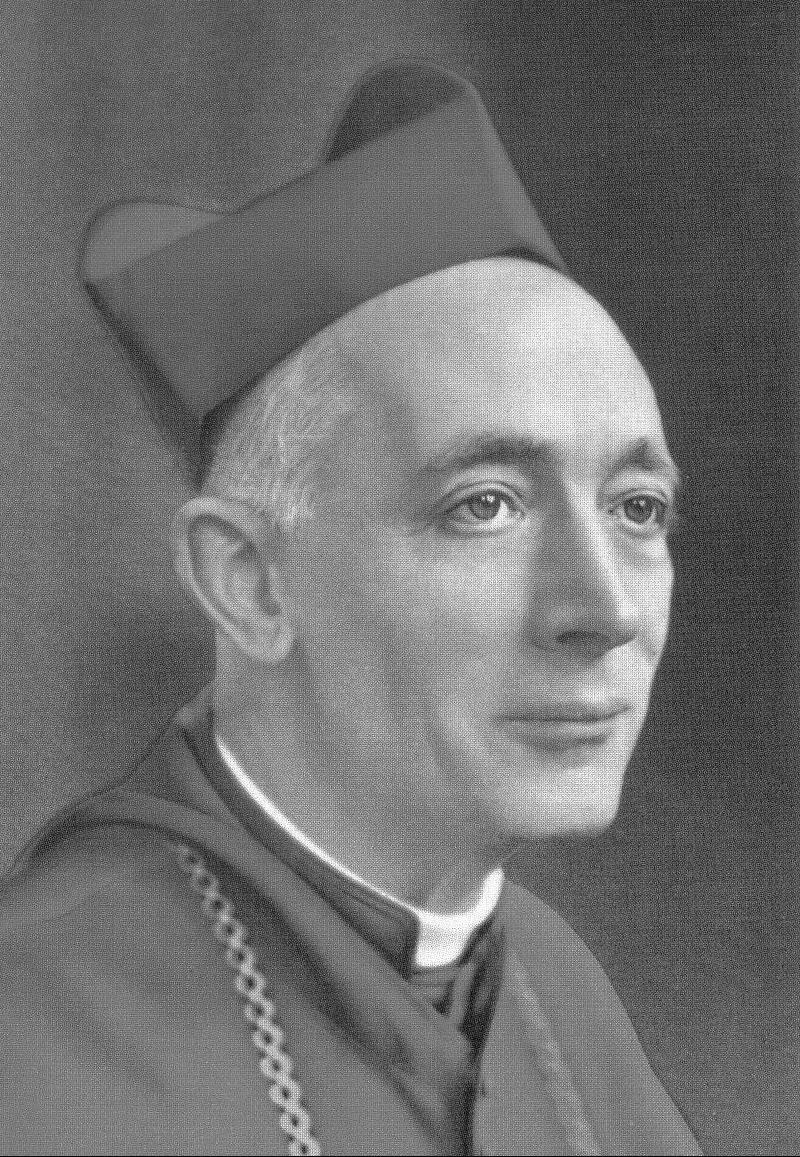PROLOGUE (IV) To See Christ
 Why did I choose this painting of Saint Antony of Egypt and Saint Paul the Hermit to illustrate today’s entry? Saint Antony’s face reflects the pure light of Christ shining from the Gospel for Saint Paul, and Saint Paul’s face reflects the same pure light of Christ shining from the Gospel for Saint Antony. When two saints meet, their encounter is incandescent with the light of Christ.
Why did I choose this painting of Saint Antony of Egypt and Saint Paul the Hermit to illustrate today’s entry? Saint Antony’s face reflects the pure light of Christ shining from the Gospel for Saint Paul, and Saint Paul’s face reflects the same pure light of Christ shining from the Gospel for Saint Antony. When two saints meet, their encounter is incandescent with the light of Christ.
Prologue of Our Most Holy Father Benedict to His Rule
4 Jan. 5 May. 4 Sept.
Having our loins, therefore, girded with faith and the performance of good works, let us walk in His paths by the guidance of the Gospel, that we may deserve to see Him Who hath called us to His kingdom. And if we wish to dwell in the tabernacle of His kingdom, we shall by no means reach it unless we run thither by our good deeds. But let us ask the Lord with the Prophet, saying to Him: “Lord, who shall dwell in Thy tabernacle, or who shall rest upon Thy holy hill?” After this question, brethren, let us hear the Lord answering, and shewing to us the way to His tabernacle, and saying: “He that walketh without stain and worketh justice: he that speaketh truth in his heart, that hath not done guile with his tongue: he that hath done no evil to his neighbour, and hath not taken up a reproach against his neighbour:” he that hath brought the malignant evil one to naught, casting him out of his heart with all his suggestions, and hath taken his bad thoughts, while they were yet young, and dashed them down upon the (Rock) Christ. These are they, who fearing the Lord, are not puffed up with their own good works, but knowing that the good which is in them cometh not from themselves but from the Lord, magnify the Lord Who worketh in them, saying with the Prophet: “Not unto us, O Lord, not unto us, but unto Thy Name give the glory.” So the Apostle Paul imputed nothing of his preaching to himself, but said: “By the grace of God I am what I am.” And again he saith: “He that glorieth, let him glory in the Lord.”
Ready for Spiritual Combat
In today’s portion of the Prologue, Saint Benedict enjoins us to gird our loins with faith and with the performance of good works. To have one’s loins girt means to be kitted out with weapons and ready for action on the battlefield. Saint Benedict may have been thinking of the Apostle’s exhortation:
Therefore take unto you the armour of God, that you may be able to resist in the evil day, and to stand in all things perfect. Stand therefore, having your loins girt about with truth, and having on the breastplate of justice, and your feet shod with the preparation of the gospel of peace: in all things taking the shield of faith, wherewith you may be able to extinguish all the fiery darts of the most wicked one. And take unto you the helmet of salvation, and the sword of the Spirit, which is the Word of God. (Ephesians 6:13-17)
Following the Guidance of the Gospel
In all things the monk is subject to the guidance of the Gospel. The Gospel is the primary and indispensable rule of monks; it is one’s habitual reference in every season of life. When a monk hears the Holy Gospel chanted at Matins or at Holy Mass, he hears the very voice of Christ. Heart speaks to heart. He listens to the Holy Gospel with such attention that not a single word of it is lost, for the least syllable of the Gospel is “more to be desired than gold and many precious stones: and sweeter than honey and the honeycomb” (Psalm 18:11).
Saint Antony the Great
Saint Athanasius writes of of Saint Antony that, “he gave such heed to what was read [at the sacred liturgy] that none of the things that were written fell from him to the ground, but he remembered all, and afterwards his memory served him for books.” Saint Antony’s careful attention to the Word of God is the model of the attention of the heart by which a son of Saint Benedict will want to listen to the Holy Gospel.
The Radiant Face of the Word
Today’s monk, having ample access to the text of the Holy Gospels, often in various languages and translations, will supplement the primary hearing of the liturgic Gospel at Matins and at Holy Mass with the reading and meditation of the Gospel in the secret of his cell. He will open the book of the Gospels as reverently as if we were opening the door of the tabernacle. He will read the sacred page in such a way as to peer through the text, as through a lattice work, in order to discover, shining through the letter of the text, the radiant Face of the Word.
Behold he standeth behind our wall, looking through the windows, looking through the lattices. Behold my beloved speaketh to me: Arise, make haste, my love, my dove, my beautiful one, and come. (Canticle 2:9-10)
Saint Benedict’s monk is animated by a single desire: he wants to see Him who has called us into His kingdom, Christ the Lord.

